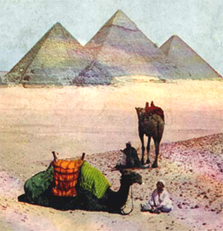With a Spanish heritage, Hispanics should have a better understanding of events in Tunisia and Egypt. The Moros (English – Moors) conquered Spain for eight centuries. We had the Reconquista in 1492 as we all know. Except today the birth rate of Spain is low and the Moro immigration and birthrates are high. There will be a time when Moro population of Spain will increase to a substantial percentage of the Spanish population.
The key issue is will the anti-regime turmoil in Tunisia and Egypt spread to Latin America?
Most of us have read Ortega y Gasset’s The Revolt of the Masses. We are aware of the 1930s Spanish Civil War and the numerous wars in Latin America. Is the sense of “violencia” in the Spanish character from our eight centuries under Moro rule?
The world is watching a 21st Century technology take hold in very traditional societies. In these Moro societies there is not a strong Anglo Saxon tradition of democracy. There is a religious aspect to the Moro upheaval. The Muslim Brotherhood may have from 20% to 25% population support in Egypt. What is unique about the Moro belief is that the “Will of Allah” controls much of individual actions. As a result there is not a sense of individual shame we have in our Christian faith.
In Venezuela in the early 1960s I remember being told of the “Revolution of Rising Expectations.” In many nations there is a young Middle Class or Middle Sector with rapidly rising expectations. When those expectations turn to frustrations, the arena is set for a mass social explosion.
What we also have is what Turgenev described in his book Fathers and Sons. There is a huge gap between generations especially in the communications technology revolution. How do you mobilize a thousand, a hundred thousand, or a million mass demonstrators? If you are a radical, how do you create mass violence and destruction? On the other hand how do you prevent a mass demonstration? How do you prevent mass violence, death, and destruction? In Spain the ETA group with a small well organized leadership has created a major impact on the Spanish nation. Also in Spain a small Moro terrorist group has created a national impact through abject terrorism. What is the role of the Military is creating stability or instability? The key issue is who actually can take control of the masses through modern communication technology to create chaos or stability?
In Argentina the politicos let the chaos reach unbearable levels, so a strong government could “re-establish” stability. So at what expense does a society establish stability at the cost of liberty and freedoms? The Communists established regimes created on freedom from choice, not freedom of choice. The State control was absolute. One measure of the cost of Soviet totalitarianism is the book Children of the Gulag by C.A. Frierson and Semyon Vilensky. In purges, deportations, mass starvations, and death by diseases, the Soviets never counted the death of children. The death of children was never a statistic. Did 20 million or 25 million children die under Soviet rule?
In Cuba the young middle class supported a move to oust the Batista regime. In Iran the young middle class supported a move to oust the Shah. Was it democracy the youth sought? In reality the old regimes in Cuba and Venezuela were replaced by totalitarian regimes. The quest for democracy resulted in a period of “demobracy” or mob rule followed by totalitarianism. In Cuba what few realized was the important television station CMQ had an infiltrated communist as personnel director. He hired covert communists and the CMQ TV station was controlled by the communists, not the owners. Plus the foreign media also fully supported Castro. Castro was a charismatic speaker and he could attract thousands for his hours-long speeches. Media played a key role in the rise of Castro.
Is the real issue that Egypt cannot create jobs, a meaningful future for the youth? Nasser overthrew the British-backed monarch. Nasser then embraced the Soviets and created an Arab socialism. Is the Egyptian turmoil a failure of socialism? The Egyptian economy is based upon tourism, $10 billion; Suez Canal revenues $5 billion; and US aid $2 billion. There is a growing oil and gas industry. Egypt has a rapidly growing population with a high percentage young and many without jobs. Many prosperous nations have a job producing economy based on exports. Egypt imports tourists, which really do not create many jobs. There is a serious question now to what extend will the current instability hurt the tourism industry? The mass riots can force closing of the Central Bank, banks, and ATMs. The turmoil has disrupted the international debt market for Egypt. Hopefully the financial turmoil is only short term.
Will the demand for regime change take root in Cuba, which is totalitarian, and Venezuela, which is fast becoming totalitarian? Hispanics have endured violent revolutions, dictators, civil war, “violencia,” popularism, and upheavals. There have been political and economic conflicts in Hispanic nations. Cuban and Venezuelans are not like the Moros. The regimes in Cuba and Venezuela will use limitless force to destroy opposition.
There is no way to predict a Moro type revolt of the masses, but the ingredients of regime change are there, or in local idiom the “fruit is ripe for falling.” Ojalá.

COMMENTS
Please let us know if you're having issues with commenting.